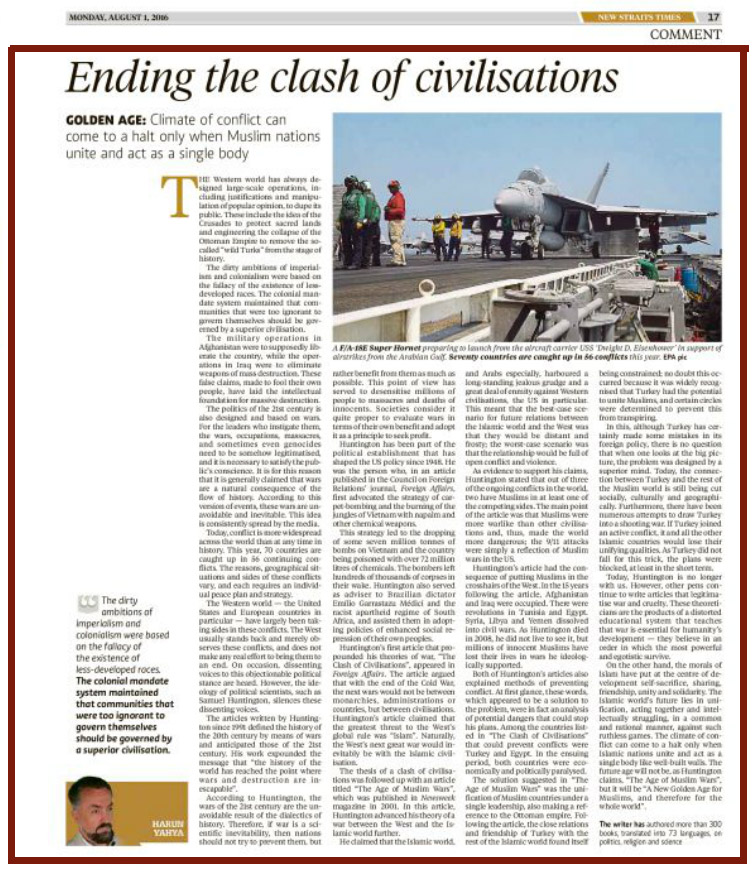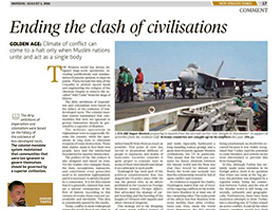
The Western world has always designed large-scale operations, including justifications and manipulation of popular opinion, to dupe its public. These include the idea of the Crusades to protect sacred lands and engineering the collapse of the Ottoman Empire to remove the so-called “wild Turks” from the stage of history.
The dirty ambitions of imperialism and colonialism were based on the fallacy of the existence of less-developed races. The colonial mandate system maintained that communities that were too ignorant to govern themselves should be governed by a superior civilisation.
The military operations in Afghanistan were to supposedly liberate the country, while the operations in Iraq were to eliminate weapons of mass destruction. These false claims, made to fool their own people, have laid the intellectual foundation for massive destruction.
The politics of the 21st century is also designed and based on wars. For the leaders who instigate them, the wars, occupations, massacres, and sometimes even genocides need to be somehow legitimatised, and it is necessary to satisfy the public’s conscience. It is for this reason that it is generally claimed that wars are a natural consequence of the flow of history. According to this version of events, these wars are unavoidable and inevitable. This idea is consistently spread by the media.
Today, conflict is more widespread across the world than at any time in history. This year, 70 countries are caught up in 56 continuing conflicts. The reasons, geographical situations and sides of these conflicts vary, and each requires an individual peace plan and strategy.
The Western world — the United States and European countries in particular — have largely been taking sides in these conflicts. The West usually stands back and merely observes these conflicts, and does not make any real effort to bring them to an end. On occasion, dissenting voices to this objectionable political stance are heard. However, the ideology of political scientists, such as Samuel Huntington, silences these dissenting voices.
The articles written by Huntington since 1991 defined the history of the 20th century by means of wars and anticipated those of the 21st century. His work expounded the message that “the history of the world has reached the point where wars and destruction are inescapable”.
According to Huntington, the wars of the 21st century are the unavoidable result of the dialectics of history. Therefore, if war is a scientific inevitability, then nations should not try to prevent them, but rather benefit from them as much as possible. This point of view has served to desensitise millions of people to massacres and deaths of innocents. Societies consider it quite proper to evaluate wars in terms of their own benefit and adopt it as a principle to seek profit.
Huntington has been part of the political establishment that has shaped the US policy since 1948. He was the person who, in an article published in the Council on Foreign Relations’ journal, Foreign Affairs, first advocated the strategy of carpet-bombing and the burning of the jungles of Vietnam with napalm and other chemical weapons.
This strategy led to the dropping of some seven million tonnes of bombs on Vietnam and the country being poisoned with over 72 million litres of chemicals. The bombers left hundreds of thousands of corpses in their wake. Huntington also served as adviser to Brazilian dictator Emílio Garrastazu Médici and the racist apartheid regime of South Africa, and assisted them in adopting policies of enhanced social repression of their own peoples.
Huntington’s first article that propounded his theories of war, “The Clash of Civilisations”, appeared in Foreign Affairs. The article argued that with the end of the Cold War, the next wars would not be between monarchies, administrations or countries, but between civilisations. Huntington’s article claimed that the greatest threat to the West’s global rule was “Islam”. Naturally, the West’s next great war would inevitably be with the Islamic civilisation.
The thesis of a clash of civilisations was followed up with an article titled “The Age of Muslim Wars”, which was published in Newsweek magazine in 2001. In this article, Huntington advanced his theory of a war between the West and the Islamic world further.
He claimed that the Islamic world, and Arabs especially, harboured a long-standing jealous grudge and a great deal of enmity against Western civilisations, the US in particular. This meant that the best-case scenario for future relations between the Islamic world and the West was that they would be distant and frosty; the worst-case scenario was that the relationship would be full of open conflict and violence.
As evidence to support his claims, Huntington stated that out of three of the ongoing conflicts in the world, two have Muslims in at least one of the competing sides. The main point of the article was that Muslims were more warlike than other civilisations and, thus, made the world more dangerous; the 9/11 attacks were simply a reflection of Muslim wars in the US.
Huntington’s article had the consequence of putting Muslims in the crosshairs of the West. In the 15 years following the article, Afghanistan and Iraq were occupied. There were revolutions in Tunisia and Egypt. Syria, Libya and Yemen dissolved into civil wars. As Huntington died in 2008, he did not live to see it, but millions of innocent Muslims have lost their lives in wars he ideologically supported.
Both of Huntington’s articles also explained methods of preventing conflict. At first glance, these words, which appeared to be a solution to the problem, were in fact an analysis of potential dangers that could stop his plans. Among the countries listed in “The Clash of Civilisations” that could prevent conflicts were Turkey and Egypt. In the ensuing period, both countries were economically and politically paralysed.
The solution suggested in “The Age of Muslim Wars” was the unification of Muslim countries under a single leadership, also making a reference to the Ottoman empire. Following the article, the close relations and friendship of Turkey with the rest of the Islamic world found itself being constrained; no doubt this occurred because it was widely recognised that Turkey had the potential to unite Muslims, and certain circles were determined to prevent this from transpiring.
In this, although Turkey has certainly made some mistakes in its foreign policy, there is no question that when one looks at the big picture, the problem was designed by a superior mind. Today, the connection between Turkey and the rest of the Muslim world is still being cut socially, culturally and geographically. Furthermore, there have been numerous attempts to draw Turkey into a shooting war. If Turkey joined an active conflict, it and all the other Islamic countries would lose their unifying qualities. As Turkey did not fall for this trick, the plans were blocked, at least in the short term.
Today, Huntington is no longer with us. However, other pens continue to write articles that legitimatise war and cruelty. These theoreticians are the products of a distorted educational system that teaches that war is essential for humanity’s development — they believe in an order in which the most powerful and egotistic survive.
On the other hand, the morals of Islam have put at the centre of development self-sacrifice, sharing, friendship, unity and solidarity. The Islamic world’s future lies in unification, acting together and intellectually struggling, in a common and rational manner, against such ruthless games. The climate of conflict can come to a halt only when Islamic nations unite and act as a single body like well-built walls. The future age will not be, as Huntington claims, “The Age of Muslim Wars”, but it will be “A New Golden Age for Muslims, and therefore for the whole world”.
Adnan Oktar's piece in New Straits Times:
http://www.nst.com.my/news/2016/08/162060/ending-clash-civilisations


